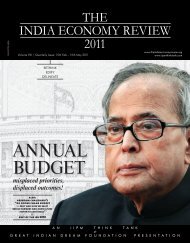Download - The India Economy Review
Download - The India Economy Review
Download - The India Economy Review
Create successful ePaper yourself
Turn your PDF publications into a flip-book with our unique Google optimized e-Paper software.
P LANNING P ARADIGM<br />
the electricity utility may be underwritten<br />
by a government guarantee. <strong>The</strong> govern-<br />
ment guarantee is in fact assisting the IPP<br />
investors to raise fi nance — not the other<br />
way around. Often the IPP will require<br />
that an Escrow account is established<br />
to ensure payment. This means that some<br />
agreed amount of government revenue<br />
(which may or may not be revenue from<br />
electricity charges) is siphoned to a foreign<br />
exchange account. <strong>The</strong>se funds are ear-<br />
marked for the IPP and government<br />
cannot touch this money. To provide<br />
‘comfort’ for investors, escrow payments<br />
may actually exceed those required by<br />
152 THE IIPM THINK TANK<br />
the PPA. 32<br />
For example in Maharashtra when<br />
Enron had come for its huge power plant<br />
at Dabhol it had a counter guarantee of<br />
regular payment for output from the<br />
Maharashtra State Electricity Board<br />
(MSEB). <strong>The</strong> MSEB has set up an ‘es-<br />
crow account’ collected from electricity<br />
consumers on which Enron would have<br />
fi rst claim in the event of default, or even<br />
delay, in paying the power station: “If<br />
MSEB fails to pay any of its obligations<br />
within fi ve business days following the due<br />
date for payment, all escrowed amount<br />
shall be retained in the escrow account and,<br />
to the extent not satisfi ed by a draw on the<br />
phase- II letter of credit, such retained<br />
money shall be paid to the company until<br />
the unpaid obligation has been paid in full.”<br />
To make the guarantee even more secure,<br />
the board gave Enron rights over 25% more<br />
than it is owed, “..... the escrow account<br />
would cover at least 1.25 times of the<br />
monthly capacity payment owing pursuant<br />
to the power purchase agreement”. 33<br />
<strong>The</strong> lack of escrow cover in some parts<br />
of <strong>India</strong> has caused a row over who has<br />
fi rst right over the revenue generated<br />
through the state electricity boards. IPPs<br />
want fi rst claim, but they are currently<br />
behind fi nancial institutions and banks. 34<br />
Some lenders have suggested that they<br />
should have access to other aspects of<br />
government revenue, such as sales tax. 35<br />
Alternatively others have suggested that<br />
investors would get some comfort from a<br />
government commitment to undertake<br />
reforms, in accordance with certain<br />
agreed milestones. 36 <strong>The</strong>se are likely to<br />
include privatisation of transmission and<br />
distribution based on the notion that<br />
private distribution companies will have<br />
a more sound revenue base and therefore<br />
more likely to pay the IPPs. 37<br />
Under these circumstances there are<br />
also questions that the public sectors<br />
electricity utilities, such as the State Electricity<br />
Boards, would amass extensive<br />
debts due to some of existing contracts<br />
with the IPPs. This also would raise the<br />
trend of privatisation of public sectors.<br />
<strong>The</strong>se situations had already turned down<br />
the government electricity generation<br />
units in Philippines and Kenya. Similar<br />
situations could also arise in <strong>India</strong>.<br />
IPPS Agreements are<br />
Uncompetitive and Infl exible38 <strong>The</strong> terms of power purchase agreements





